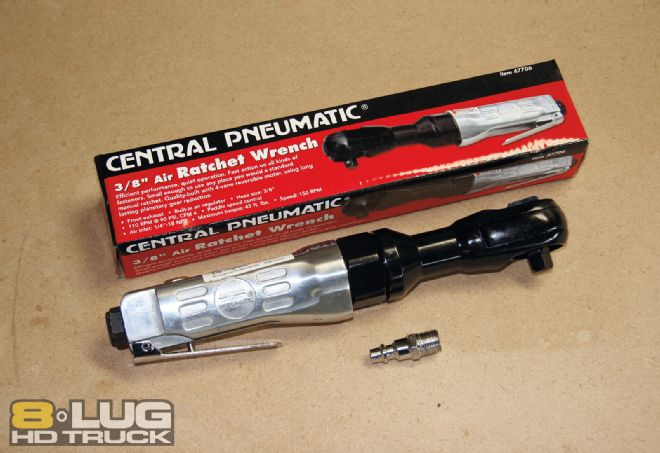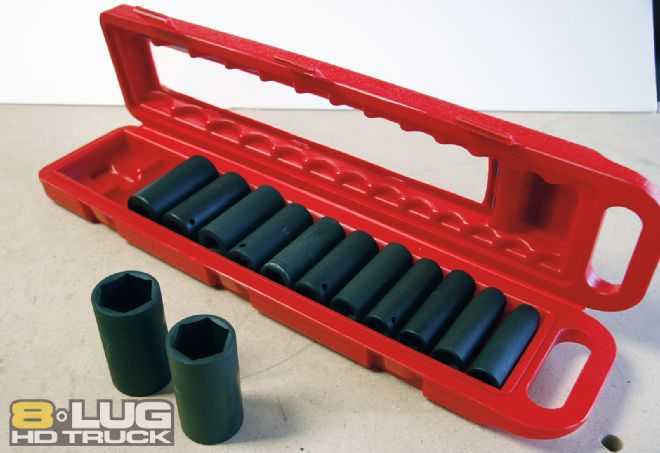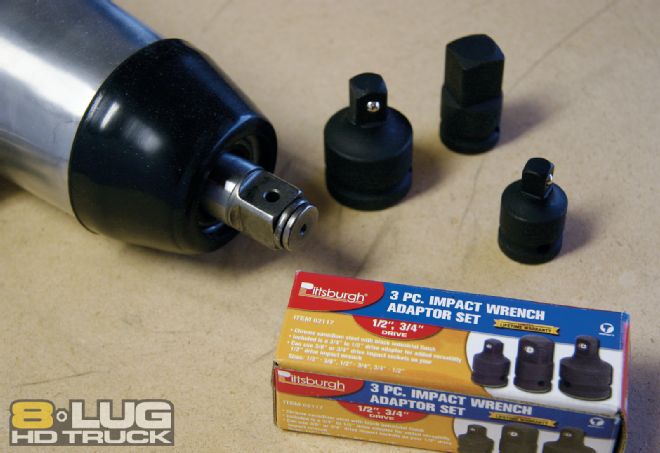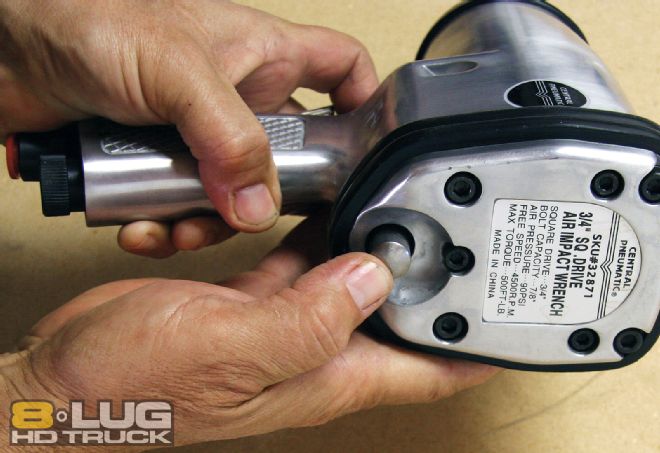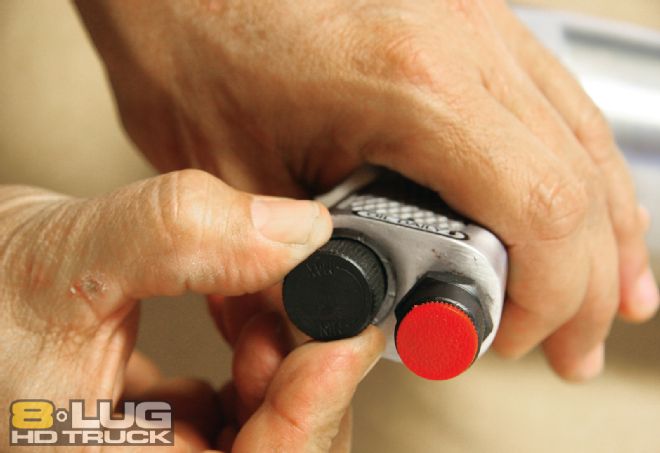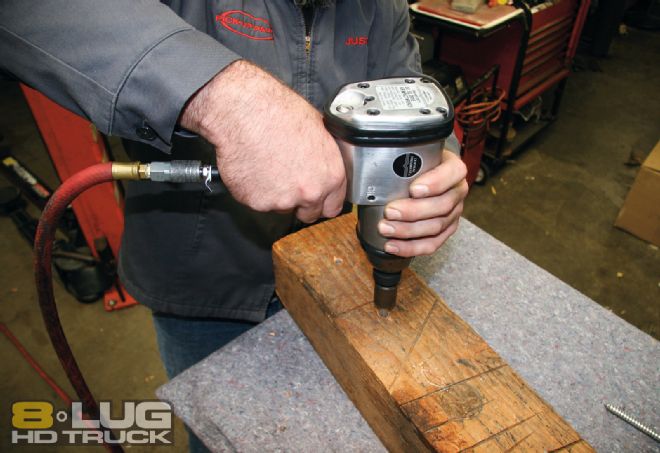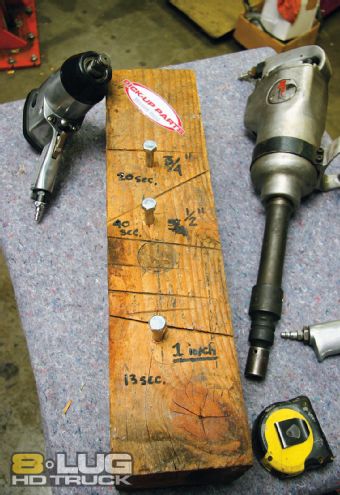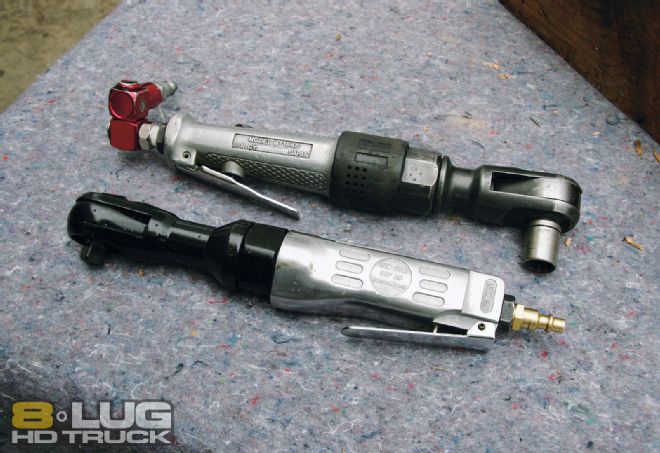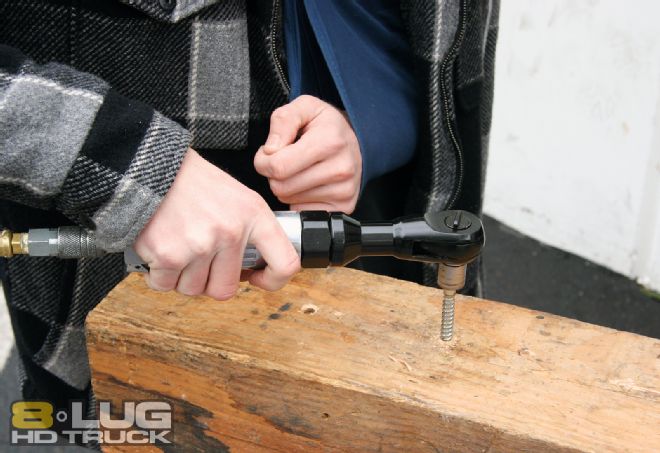Is it smart to shop for inexpensive shop tools? The short answer is yes, if you don't make a living using your equipment.

| We used two different pneumatics from Harbor Freight to see if they would stand up to some moderate tests of performance. The 3/4-inch impact and 3/8th-inch ratchet are about as inexpensive as these tools get. They performed equally well in a series of tests.
There are reasons why people should invest in quality tools—durability, efficiency, and peace of mind, for starters. However, if you are a weekend warrior with only occasional projects, then buying inexpensive tools allows you to build a sizable toolbox without breaking the bank. And certain bargain-priced tools come with features that go head-to-head with more expensive products—if you do the research.
We're not suggesting that a professional in the trades would save by gambling on inexpensive tools. After all, brand names like Snap-on, Makita, Milwaukee, and DeWalt offer a proven track record, and that added confidence means everything in the field. But if you only use your tools on occasion, it pays to shop around.
Where to Look
We bench-tested some typical budget-priced tools that are available from Harbor Freight. One thing we learned is that Harbor Freight buys in such bulk that it can afford to pass the savings on to its customers—like Wal-Mart. These aren't known brands and long-term durability could be an issue if you're going to use the tools a lot. But none of this should matter to the weekend wrench. Besides, Harbor Freight has an incredibly friendly return policy.
Actually, what initially prompted us to consider affordable tools was a YouTube video showing Harbor Freight's Central 1/2-inch impact failing to remove lug nuts on a fullsize truck. That's an easy job for an impact, but according to the video clip, the Central was more toy than tool. Could it be? We decided to do our own field test and put a Central 3/4-inch pneumatic pistol grip and a 3/8-inch air ratchet up against a cadre of shop tools to see what happened.

| The Central 3/4-inch impact offers features akin to the much more expensive brand names and is ideal for busting loose lug nuts and driving huge bolts in wood, metal, or anything where 500 ft-lb of torque is required.
While you can get away with a 1/2-inch impact for lug nuts, the bigger, 3/4-inch impact is quicker and you can use it for more things, like stubborn, rusted chassis bolts or heavy-duty suspension parts that require lots of torque. Be forewarned, if you use a 3/4-inch impact for tightening things, the force can also sheer a bolt head in seconds if you're not careful.
The Central 3/4-inch impact from Harbor Freight operates at a standard 90 psi and offers a maximum 500 ft-lb of torque using 7 cfm (cubic feet per minute), very similar to more expensive impacts on the market. It features a variable speed of 1,000 to 4,500 rpm, thanks to an air-regulator knob on the grip handle. There's also a push-button forward and reverse feature. On the downside, it weighs several pounds and took both hands to operate. More expensive impacts of this size are lighter and more comfortable to handle.
As impacts go, it was the cheapest 3/4-inch we found online, retailing at $59.99. Brand names can easily cost $150 to $500. We also tested a 3/8-inch Central air ratchet from Harbor Freight that spins at 150 rpm with 45 ft-lb of torque. It, too, appeared to be a good-quality, cast-aluminum air ratchet (retail $22.99) , but without the price tag of the brand names.
Our Tests
Using a new 15-gallon DeWalt (D55168/200-psi) stand-up compressor, we set up a few challenges for our tools. Incidentally, we'll be evaluating the DeWalt compressor in a future issue of 8-Lug to give you a more in-depth look at its latest product.
Our immediate goal was to see if the Harbor Freight tools could perform on par with tools from Matco, Ingersoll Rand, and others. We also used Harbor Freight's deep-wall impact sockets, which retail for less than $20 a set, on some of the tests. Other impact sockets we found were three times as expensive, although you might think long-term durability could be an issue with the cheaper sockets. But it would be very difficult to break an impact socket—even a cheap one.
Up front, we spun the wheel lugs off a fullsize rig in seconds. Essentially, we wanted to see if the 7-cfm Central impact triggered a compressor restart, which would potentially slow up a project. It didn't, and the Central proved to be plenty powerful for a simple set of lugs torqued down to 90 or so ft-lb.
Next, we took the 3/4-inch impact to our friends at Pickup Parts in Mission Viejo, California, and asked the crew to help us drive 1/2-inch (shank) by 5-inch lag bolts into a block of solid wood using three different-sized impacts running off an 80-gallon stand-up air compressor. The idea was to estimate the speed differences between a 1/2-inch, 3/4-inch, and 1-inch impact. The results were impressive. An Ingersoll Rand 1/2-inch impact sank the bolt into the block in 40 seconds. The 3/4-inch Central took just 20 seconds. Then the professional-level 1-inch impact did the job in just 13 seconds. Yes, size mattered in this instance.
Finally, we put a professional-model 3/4-inch impact up against the Central 3/4-inch impact for a head-to-head speed test. Using the same 1/2-inch shank lag bolts, we timed each tool's performance. The Central took just 20 seconds to sink the bolt and the other shop impact took 86 seconds. To our surprise, the Central shaved more than 60 seconds off the test. But to be fair, the Central was new and the other impact had seen a few years of use. Nevertheless, the results were impressive when you consider the modest price of the Harbor Freight tool.
We then put a Central 3/8-inch air ratchet from Harbor Freight up against a Matco that cost more than 10 times as much. The Harbor Freight Central sank a 2.5-inch-long bolt in 11 seconds. The Matco did the job in 8 seconds and was clearly the winner. But the Matco ratchet came at a cost. We questioned whether three seconds was worth the investment. In our opinion, both Central air tools proved their value by repeatedly performing well against more expensive equipment.
What We Learned
From this unscientific evaluation of budget tools from Harbor Freight, we learned that certain inexpensive items work well with small jobs, even head-to-head against the competition. Of course, buying cheaper tools might not fit in with your long-term goals, and the ultimate decision to buy or not is entirely yours to make. But the tests proved that being cheap doesn’t mean you're getting junk as the YouTube video suggested. Both impacts worked as promised and even surprised us with their performance.
If you shop around you can find real bargains just like we did, and if your tools are maintained regularly, even an inexpensive tool can last many years. In a future issue, we'll look at other specialized tools and accessories for the frugal do-it-yourselfer.
